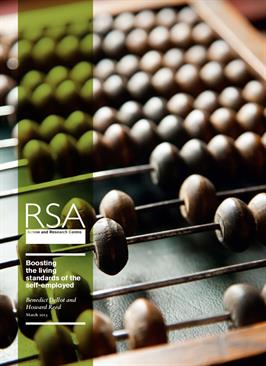New measures are needed to improve the living standards of the most vulnerable self-employed, with changes to National Insurance, Universal Credit, pensions and maternity and paternity pay being key priorities.
The number of people in self-employment has grown by 40 per cent since 2000, with the result that a record 1 in 7 of the workforce now answer to themselves. Should these growth rates continue, the RSA predicts that the UK’s self-employed community could soon outnumber the public sector workforce.
Political parties of all stripes have come out in support of this boom and put forward several proposals to assist the self-employed. Among the measures introduced by the Coalition government are the StartUp Loans scheme, the abolition or amendment of 3,000 regulations, and the introduction of multiple tax breaks. Labour have sought to match these initiatives with several of their own pledges, including a promise to create a network of regional banks to improve lending to small firms.
While each of these moves should be welcomed, they are overwhelmingly centred on supporting businesses as entities in themselves, rather than the individuals that sit behind these businesses. Put another way, they have sought to help firms become profitable as opposed to making self-employed lives liveable.
Against this backdrop, the RSA embarked on a project to better understand how the livelihoods of the self-employed could be improved. In doing so, we examined issues such as earnings, pensions, mortgages and welfare. The main challenge facing the self-employed is that the burden of dealing with risks largely falls to them alone. For example, they have no recourse to Statutory Sick Pay should the fall ill, nor to Statutory Maternity Pay if they become pregnant.
Yet despite these perils and pitfalls, our analysis reveals that the self-employed are on average more satisfied than employees both with their work and life overall. As such, our proposals should not be framed as a means of ‘saving’ people from self-employment, but rather as a way of enabling more people to take part in meaningful self-employment, which at its best allows workers to flourish as creative individuals.
pdf 1.3 MB
Contributors



Join the discussion
Comments
Please login to post a comment or reply
Don't have an account? Click here to register.
Having been variously in and out of employment, self-employment and unemployment over the years like a three-way yo-yo, may I offer one comment from experience.
Self-employment is not a passport to a steady income. In boom times that is not a problem but in times of bust or a shakeout in one's chosen profession it can be devastating. Of all the workplace sectors the self-employed are the most exposed to the ups and downs of the economy - a larger paymaster will cut costs and put their staff first by dumping contracts and bringing work back in-house. A contract up for renewal may be terminated at a day's notice. Sometimes past profits will carry one across, but at other times competition for work will have lowered rates and killed any chance of profit. The lower-paid are of course the most vulnerable and least able to survive the experience. And once dumped, the self-employed have less support to find new work: "My contract ended yesterday" cuts no ice and will not bring us immediate unemployment benefit to help bridge those gaps. I'd like to see this issue added to those already mentioned.
As a self-employed teacher and mentor I am encouraged by the evidence that the self-employed have more job and life satisfaction but saddened that we are depriving our young people of this opportunity by not promoting self-employment as a career choice. Enterprise education is key and should be a mandatory part of the curriculum.
Between 2005 and 2010 I ran the Kent cohort of the South East's Enterprise Gateway - an award-winning SEEDA-funded initiative to drive up enterprise levels (and specifically self-employment) in the South East's most deprived wards. During this time I coached and trained over 2,500 people with an interest in self-employment and discovered the following:
- Over 90% of the young people I work with had never considered self-employment
- Over 80% of young people pursuing a business idea wanted to set up a social enterprise or ethical trading business
- 95% of my clients wanted to set up salary replacement businesses. The had no interest in business growth or employing staff.
- 55% of my clients didn't need finance to start. They just needed a few pointers and introduction to a peer support network and customers.
- 72% of women going self-employed wanted a business which would fit around childcare, lifestyle and husband
- Over 65% of my clients felt they needed "approval" of their idea before pursuing it. Something they felt they wouldn't get from a Chamber of Commerce, Business Link or banks. Hence they hadn't actively pursued them until we actively sought them out and worked with them.
Fascinated by your research. Get in touch if my experience would be of any use to you.